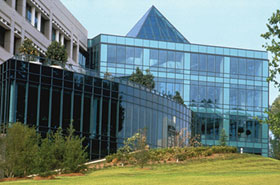COMPETITIVENESS AWARD
Industrial Transition
On the incentives front, the state legislature will begin work this spring on modifying the William S. Lee Act, which is North Carolina's oldest incentives package. William S. Lee tax credits include those for job creation, machinery and equipment investments, work- force
 |
| In August 2005, GlaxoSmithKline announced a $92-million, 200-job expansion at its manufacturing facility in Zebulon. |
Biotech and information technology, especially in and around Research Triangle Park, may have supplanted furniture manufacturing and textiles as the state's signature industries. But North Carolina still competes for – and wins – projects in those industries' current versions. Investment in nonwoven products facilities totals nearly $400 million since 2003, and much of that investment is from outside the United States. Examples include a $50- million project for Netherlands-based DSM Dyneema in Pitt County, a $27-million investment in Davie County from Israel-based Avgol America and a $40- million project for Swiss firm Jacob Holm in Buncombe County. U.S. companies Carolina Nonwovens and Polymer Group, Inc., have invested $10 million and $40 million respectively within the past year.
"Because of our history in manufacturing and textiles and with the support of the School of Textiles at North Carolina State, we have been very successful in recruiting and encouraging expansions of nonwoven projects," says Fain. "But also, the expansion of GlaxoSmithKline is in large measure a function of what I consider to be a peerless training capacity for life sciences and biopharma companies. They have global choices for expanding production, and we are uniquely positioned to compete for those projects because of the training available from the community colleges, the university system and substantial involvement of the industry in making sure we're developing curricula that support those operations."

